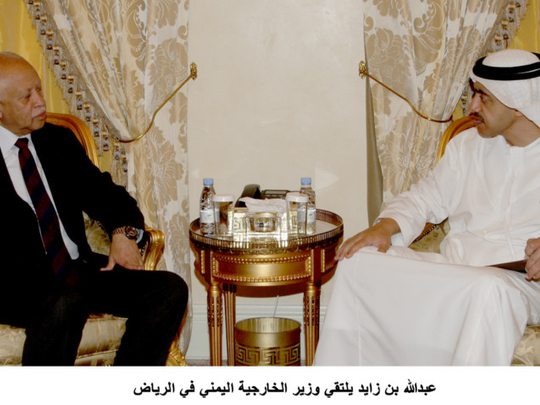
Abu Dhabi: The Gulf Cooperation Council’s (GCC) ministerial council welcomed the outcome of the Riyadh conference to tackle the Yemeni crisis. Shaikh Abdullah Bin Zayed Al Nahyan, UAE Foreign Minister, led the UAE delegation participating in the council. In the final communique released at the end of the 135th session, the council praised the conference which resulted in the Riyadh declaration and a host of resolutions backing the legitimacy in Yemen, as well as bolstering the country’s security and stability, and continuing the political process as per the GCC initiative, outcomes of the national dialogue and United Nations Security Council Resolution No. 2216.
The council also hailed Saudi Arabia’s initiative to provide a grant of $274 million (Dh1 billion), which will be used to finance the UN’s humanitarian efforts, the $100 million grant provided by Kuwait to support humanitarian operations, and grants given by other GCC countries.
Regarding the Iranian nuclear programme, the council once again expressed hope the framework agreement between Iran and P5+1 Group will lead to a final comprehensive agreement that ensures the peacefulness of the nuclear programme and that its in line with international safety standards under the supervision of the International Atomic Energy Agency.
The council denounced and rejected provocative statements on Bahrain and its people by Iranian Supreme Leader Ayatollah Ali Khamenei, during the inauguration of the Islamic Awakening conference in Tehran. The council said such statements contradict reality, Islamic values, international laws and principles of good neighbourly relations.
The council also denounced Iran’s occupation of the UAE’s three islands, Greater Tunb, Lesser Tunb and Abu Mousa.
The council praised the results of the Donors Conference for Syria, which was held in Kuwait on May 30. It called on donating nations to quickly fulfil their commitments to their pledges.
The council rejected statements that falsely accused some GCC countries of supporting terrorism. It emphasised the Gulf’s stand against terrorism threats facing the region and world, as well as the GCC’s continued effective participation in the international coalition combating Daesh.
The council stressed the GCC’s unwavering stand against all forms of terrorism and extremism regardless of its motives or origin, and drying up sources for funding terrorism. It condemned the two terrorist attacks against mosques in Saudi Arabia, which killed dozens and injured innocent civilians.
The council reaffirmed its firm stand towards Iraq, which is to respect the country’s sovereignty, independence and unity of its lands, and its stand against foreign intervention in its domestic affairs. It urged other countries to adopt the same stand towards Iraq and not to use the country’s land to shelter or train terrorist groups in order to harm neighbouring nations.
Regarding the situation in Palestine and developments in the Arab-Israeli conflict, the council stressed that a permanent peace will not be achieved unless Israel fully withdraws from 1967 territories and an independent Palestinian state is established with East Jerusalem as its capital. The council welcomed the announcement pertaining to Palestine becoming a member of the International Criminal Court, and said that such a move strengthens country’s international position and preserves the rights of the Palestinian people.
The council denounced statements by Israeli Prime Minister Benjamin Netanyahu regarding Occupied Jerusalem and his announcement that more colonies will be built, in direct violation of international law and UN resolutions.










